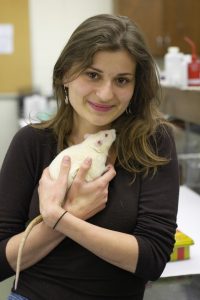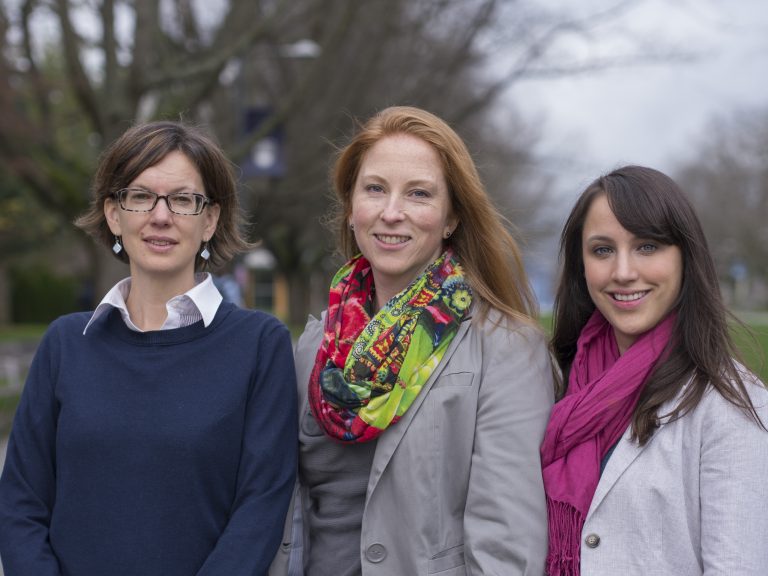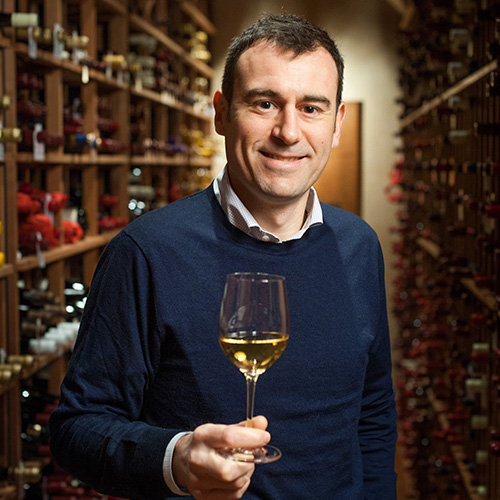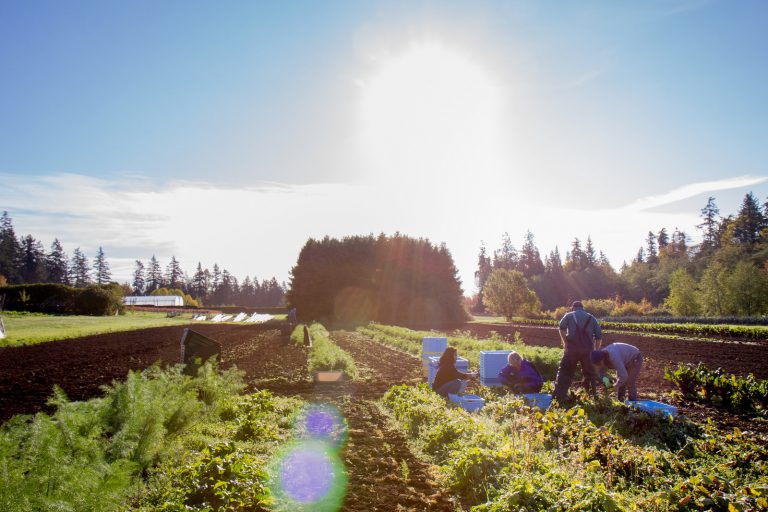
Dietitians Day: Q&A with Melissa Baker
March 15, 2017
March 15th is Dietitians day – a day to celebrate dietitians as health care professionals, who are committed to using their specialized knowledge and skills in food and nutrition to improve the health of Canadians. The UBC community is very fortunate to have registered dietitians on campus to support students, faculty and staff, some of whom are also proud alumni.
Melissa Baker is one such dietitian. She is a graduate of UBC’s integrated dietetic program at the Faculty of Land and Food Systems, and is currently the Manager, Nutrition and Wellbeing for UBC Student Housing and Hospitality Services. In honour of Dietitians Day, Melissa shares with us what she loves about her job, what the key ingredient to a healthful diet really is, and how her time as a student at LFS went beyond studying nutrition.
In your current job, you help students make healthy decisions about food. Is there a specific part of that process that you find rewarding?
Helping people and using food to make nutrition advice come to life! Food is so deeply connected to many areas of our lives – everyone needs nourishment. And when you eat well and share meals with others, quality of life improves dramatically. I love being an integral part of this process.
On your blog, you say “basic cooking skills are a key ingredient in a healthful diet.” Which skills in particular?
Yes — this is so important! Having the food skills to be able to plan, purchase, and prepare quick and balanced meals is vital. Knowing you can cook the basic staples with ease makes eating well more enjoyable and more budget friendly. For example, food skills like being able to quickly cook some whole grains, or cook beans from dried, or knowing how to marinate tofu so it taste delicious, or learning how to cook a whole chicken can save you money and make eating well flavourful and simple. Most people know what a healthful diet looks like; the trouble is knowing how to maintain one without a lot of effort and stress. Food skills are essential to this equation! You might not pick up fast food on the way home from work if you know you can have a home cooked meal on the table in 20 min: Cook a whole grain, like quinoa, in 15 min, while you pan fry some pre-marinated fish or tofu, and steam a few vegetables – voila!
Healthy eating can sometimes be associated with having a higher cost. How would you respond to this concern?
This is a misconception. All that processing and packaging that goes into convenience and ultra processed foods cost extra money! Healthy eating on a budget really comes down to food skills, as I previously described. If you know what to do with the foods on sale each week, and how to cook cheaper (usually tougher) cuts of meat, delicious vegetarian meals, and so on you will save money. Knowing how much food to buy and how to store it to prolong shelf life is key, too. Whole grains, legumes, and unprocessed fruits and vegetables, including potatoes, can be very affordable – you just have to know what to do with them and have a bit of time to spend in the kitchen. You don’t have to buy trendy, expensive “superfoods” or organic everything to eat healthfully. Keep it simple and stick to the seasonal basics.
Do you have any quick tips for those of us who have little time to cook and tend to grab something on-to-go, but still want to eat healthy?
Many Canadians that have a bit of disposable income will spend the extra money on convenience foods to save time. Make these convenience foods nutrient dense options! Spend the extra money on pre-cut and washed vegetables and fruit if that is going to help you eat more of them. I usually buy some pre-washed greens to ensure I have some ready to go when I need them. If I don’t do this, I don’t eat them.
Keep a bowl of portable fruit (apple, banana, orange) by the door to grab on your way out and keep healthy snacks, like trail mix and dried chickpeas, in your desk. If you have some go-to eateries that you grab lunch at, look for nutrition information if they provide it and always aim to make half your plate vegetables at lunch and dinner no matter where you are eating. If you eat at UBC, the dining halls are open to the public and have great salad bars, roasted vegetables, in-house made soups, custom-made sandwiches, and more that fit into a healthy diet and can be taken to go (try to bring your own container). Look for the Harvest line around campus too; there are healthy grab-and-go options, like nicoise or quinoa salads, veggies with a house-made avocado yogurt dip, blueberry chia pudding, or fruit with yogurt and granola.
Make sure you do some planning on the weekend as well. Make a simple meal plan for the week! Pre-cook some grains, wash and chop fruits and vegetables, prepare some snacks and breakfasts (like my fruity breakfast cookies), and so on. This takes some discipline but makes eating well all week so much easier! Ensuring you have some homemade meals in the freezer can be a lifesaver during a busy week too.
How has the time you spent as a student in the Faculty of Land and Food Systems helped to prepare you for a career as a dietitian?
Having the UBC dietetics program within the Faculty of Land and Food Systems provides a unique opportunity for students. I am so thankful that I had an opportunity to learn more deeply about agriculture and the food system. As a dietitian, it is key to understand the effects that my work may have on the food system, especially within more wide reaching policies. For example, take the long-standing recommendation to eat two servings of fatty fish a week: If everyone did that and paid no attention to the sustainability of the source, we would be out of fish pretty fast! Dietitians field so many questions that require a good understanding of food production, processing, and distribution. Questions about buying local, organic, or fair trade, for example.
The role for dietitians working in agriculture is only going to expand as the link between nutrition and food production becomes top of mind. There is evidence that trust in our food system is declining – dietitians, government, and others working in food production and processing need to work to assure the public that our food is produced in an ethical, sustainable, and socially responsible manner. We have seen much more interest in organizations like the Canadian Centre for Food Integrity, Agriculture More Than Ever, and Food and Farm Care Canada, which have dietitians working with or for them. The agriculture industry has recently showed an increased interest in working with dietitians as well. Courses within the LFS faculty are key to ensuring dietitians, including myself, are prepared to work in a variety of areas within our food system.
Thank you Melissa!
Be sure to check out Melissa’s tips and articles on the UBC blog, and her personal blog.
Bio
Melissa Baker is a registered dietitian with a passion for health and wellbeing. She strongly believes in choosing food that is both healthful and delicious! Melissa is also a big advocate for taking time to share meals with friends and family, and believes that basic cooking skills are a key ingredient in a healthful diet.
After graduating from UBC’s integrated dietetic program in the Faculty of Land and Food Systems, Melissa worked in many different practice areas including clinical, retail, industry, media, and consulting. In 2014, Melissa went back to school to do a Master of Health Science in Nutrition Communication from Ryerson University. She loves being a part of the exciting nutrition world and staying up-to-date on nutrition trends.
Melissa is currently the Manager, Nutrition and Wellbeing for UBC Student Housing and Hospitality Services. She provides counselling and educational outreach to students in residence at UBC, supports UBC Wellbeing initiatives, works with the culinary team to increase the healthy offerings, and writes articles for her UBC blog. She also writes for the Huffington Post, her personal blog (upbeet.ca), and volunteers for the Dietitians of Canada Board of Directors.
Tagged with:







